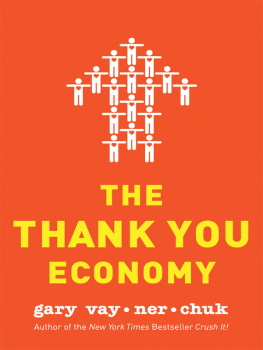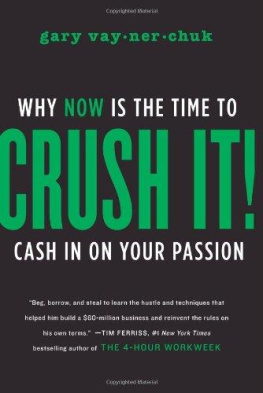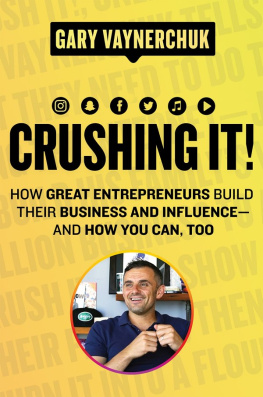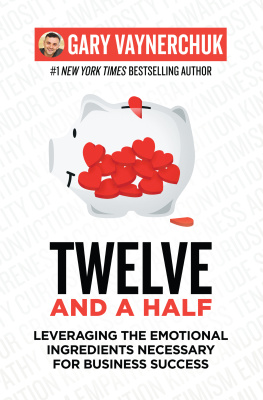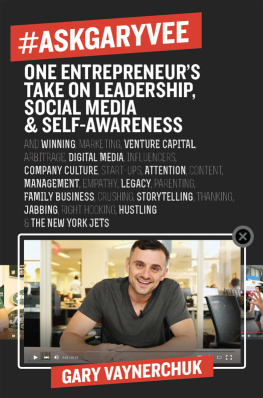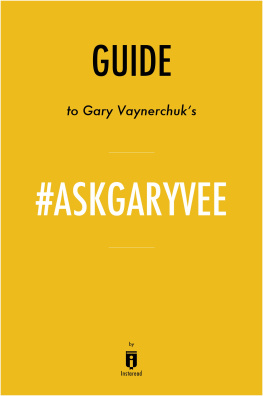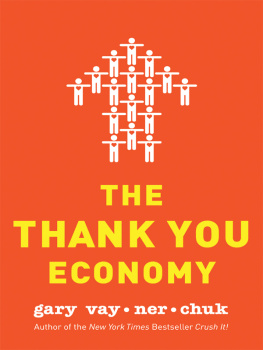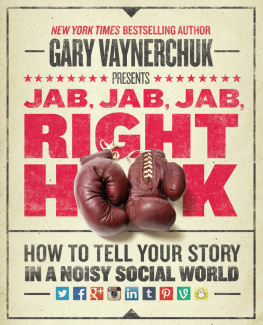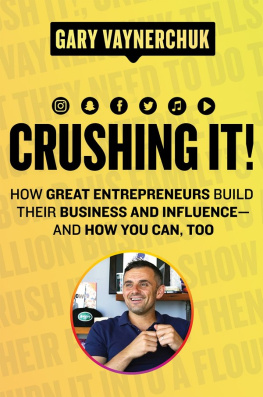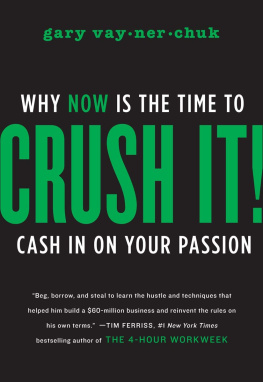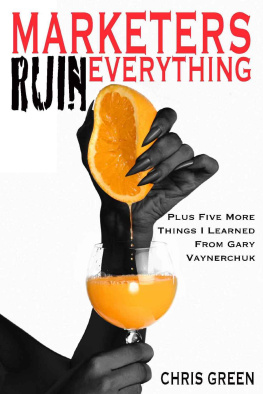Gary Vaynerchuk - The Thank You Economy
Here you can read online Gary Vaynerchuk - The Thank You Economy full text of the book (entire story) in english for free. Download pdf and epub, get meaning, cover and reviews about this ebook. year: 2011, publisher: HarperCollins Publishers, genre: Business. Description of the work, (preface) as well as reviews are available. Best literature library LitArk.com created for fans of good reading and offers a wide selection of genres:
Romance novel
Science fiction
Adventure
Detective
Science
History
Home and family
Prose
Art
Politics
Computer
Non-fiction
Religion
Business
Children
Humor
Choose a favorite category and find really read worthwhile books. Enjoy immersion in the world of imagination, feel the emotions of the characters or learn something new for yourself, make an fascinating discovery.
- Book:The Thank You Economy
- Author:
- Publisher:HarperCollins Publishers
- Genre:
- Year:2011
- Rating:3 / 5
- Favourites:Add to favourites
- Your mark:
- 60
- 1
- 2
- 3
- 4
- 5
The Thank You Economy : summary, description and annotation
We offer to read an annotation, description, summary or preface (depends on what the author of the book "The Thank You Economy " wrote himself). If you haven't found the necessary information about the book — write in the comments, we will try to find it.
The Thank You Economy — read online for free the complete book (whole text) full work
Below is the text of the book, divided by pages. System saving the place of the last page read, allows you to conveniently read the book "The Thank You Economy " online for free, without having to search again every time where you left off. Put a bookmark, and you can go to the page where you finished reading at any time.
Font size:
Interval:
Bookmark:

To my family and friends, but especially to
Lizzie and Misha, the two girls who make me
want to breathe.
This telephone has too many shortcomings to be seriously considered as a means of communication.
Western Union internal memo, 1876
The wireless music box has no imaginable commercial value. Who would pay for a message sent to nobody in particular?
an investor in response to David Sarnoffs push for radio, 1920
While theoretically and technically television may be feasible, commercially and financially it is an impossibility.
Lee De Forest, radio pioneer, 1926
Visionaries see a future of telecommuting workers, interactive libraries and multimedia classrooms. They speak of electronic town meetings and virtual communities. Commerce and business will shift from offices and malls to networks and modems. And the freedom of digital networks will make government more democratic. Baloney.
Cliff Stoll, author, astronomer, professor, 1995
If I had a nickel for every time an investor told me this wouldnt work
Jeff Bezos, founder of Amazon
I ve been living the Thank You Economy since a day sometime around 1995, when a customer came into my dads liquor store and said, I just bought a bottle of Lindemans Chardonnay for $5.99, but I got your $4.99 coupon in the mail. Can you honor it? Ive got the receipt. The store manager working the floor at the time replied, No. I looked up from where I was on my knees dusting the shelves and saw the guys eyes widen as he said, Are you serious? The manager said, No, no. You have to buy more to get it at $4.99. As the man left, I went over to the manager and said, That guy will never come back. I was wrong about that; he did come back. He came back a couple of months laterto tell us he would never shop with us again.
Now, I wasnt any nicer than this manager, nor have I ever been a softie when it comes to business. However, though I was young and still had a lot to learn, I knew deep in my gut that he had made the wrong call. The manager believed he was protecting the store from a customer trying to take advantage of it; all I could see was that we had missed an opportunity to make a customer happy.
Make no mistake: Ive always seen business as a way to build a legacy, and a way to make people happy, but Ive also been in the game to make money, not just to spread sunshine and rainbows. Im the kid who ripped peoples flowers out of their yards and sold them back to their owners. My incentive to make that customer happy wasnt purely altruistic; it was that happy customers are worth a lot more than any other kind. It was grounded in my belief at the time that a business is only as strong as its closest customer relationships, and that what those customers said about our business beyond our four walls would shape our future.
I didnt write The Thank You Economy to encourage businesses and brands to be nicer to their customers. I wrote it because what I believed was true back then is turning out to be even truer today. Im intuitive that way. Its why I knew I should sell all my baseball cards and go into toy collectibles; why I launched WineLibrary.com in 1997 when nobody thought local liquor stores belonged online; why I decided to go all in on Australian and Spanish wines in 1999 when everyone else was still obsessed with France, California, and Italy. Its how I knew to use Twitter from the get-go, and that video blogging was going to be a big deal. And its why I know Im right now.
I want people who love running businesses and building businesses as much as I dowhether theyre entrepreneurs, run a small business, or work for a Fortune 100 companyto understand what early adopters like me can already seethat we have entered a new era in which developing strong consumer relationships is pivotal to a brand or companys success. We have been pushing our message for too many decades. Its no longer enough that a strong marketing initiative simply funnels a brands one-way message down the consumers throat. To have an impact, it will have to inspire an emotionally charged interaction.
Just as open, honest communication is the key to good interpersonal relationships, so is it intrinsic to a brand or businesss relationships with its customers. People embraced social media because communicating makes people happy; its what we do. Its why we carved pictures into rocks. Its why we used smoke signals. Its why ink won. And if someone ever develops a tool that allows us to communicate telepathically, well be all over that, too. How businesses will adapt to that kind of innovation, I have no idea. But they will, Im sure. At least, the ones I am associated with will.
In the meantime, companies of all stripes and sizes have to start working harder to connect with their customers and make them happy, not because change is coming, but because its here. Imagine how many more people would have heard that wed lost an unhappy customers business if the man who couldnt get his coupon redeemed at Wine Library all those years ago had had a cell phone loaded with a Twitter and Facebook app. Whats more, the changes weve already seen are just the first little bubbles breaking on the waters surface. The consumer Web is just a babymany people reading this right now can probably clearly remember the world pre-Internet. The cultural changes social media have ushered in are already having a big impact on marketing strategies, but eventually, companies that want to compete are going to have to change their approach to everything, from their hiring practices to their customer service to their budgets. Not all at once, mind you. But it will have to happen, because there is no slowing down the torpedo-like speed with which technology is propelling us into the Thank You Economy. I, for one, think thats a good thing. By the time youre done with this book, I hope youll agree.
T hink back on the last time someone did something nice for you. I dont mean just holding the door open; I mean watching your dogs while you were away for the weekend or driving forty minutes to pick you up at the airport. How did you feel afterward? Grateful, maybe even damn lucky to know someone who would go out of his way like that for you. If given the chance, youd be sure to reciprocate. You might not even wait to be given a chanceyou might just do something to make him happy, and show your gratitude, because you could. Most of us recognize that to have someone like that in our life is a gift, one that shouldnt be taken for granted.
In fact, no relationships should be taken for granted. They are what life is all about, the whole point. How we cultivate our relationships is often the greatest determinant of the type of life we get to live. Business is no different. Real business isnt done in board meetings; its done over a half-eaten plate of buffalo wings at the sports bar, or during the intermission of a Broadway show. Its done through an enthusiastic greeting, with an unexpected recommendation, or by offering up your cab when its raining. It happens in the small, personal interactions that allow us to prove to each other who we are and what we believe in, honest moments that promote good feelings and build trust and loyalty. Now imagine you could take those interactions and scale them to the hundreds, thousands, or even millions of people who make up your customer base, or better yet, your potential customer base. A lot of people would insist that achieving that kind of scale is impossible, and up until about five years ago, they would have been right. Now, though, scaling those interactions is not only possibleprovided you use the right tools the right wayits necessary. In fact, those companies and brands that refuse to try could jeopardize the potential of their business, and in the long term, even their very existence.
Font size:
Interval:
Bookmark:
Similar books «The Thank You Economy »
Look at similar books to The Thank You Economy . We have selected literature similar in name and meaning in the hope of providing readers with more options to find new, interesting, not yet read works.
Discussion, reviews of the book The Thank You Economy and just readers' own opinions. Leave your comments, write what you think about the work, its meaning or the main characters. Specify what exactly you liked and what you didn't like, and why you think so.

